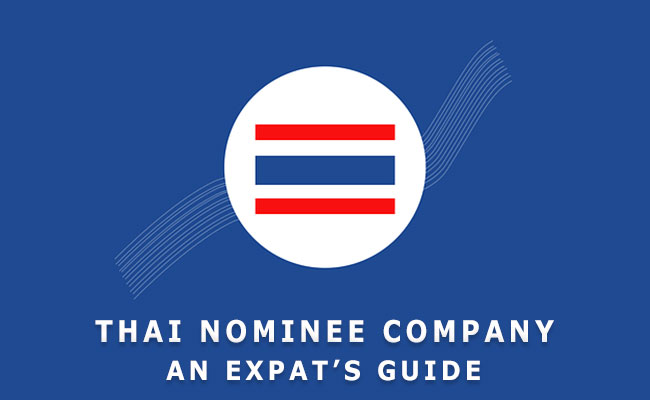You've probably heard about the recent clampdown on foreign businesses operating illegally in Thailand, in Phuket in particular. Indeed, local police noted that there are in excess of 400 business operating as “nominee companies”.
But what exactly does this mean. How can a business that has been in operation for a long time be illegal in any way?
Well, for decades now there has been a way to circumvent the law, and it isn't necessarily easily detected unless a considerable investigation of the business takes place. A business can have all the correct documentation, pay its taxes, employ its staff legally, but still have a structure that is illegal.
Adding to the layer of complexity is the fact that the business would have been set up with the help of a local lawyer, and with the knowledge of local government agencies. So what's the deal here?

A Thai Nominee Company Setup
A Thai nominee shareholder company refers to a situation where a foreigner sets up a company in Thailand but uses Thai individuals as “nominees” to hold shares on their behalf. This practice is often employed to circumvent legal restrictions or requirements placed on foreign ownership of businesses in Thailand.
Here's how it typically works:
1. Ownership Structure
In order to comply with Thai law, which restricts or limits foreign ownership in certain industries, a foreign individual or entity may set up a company with Thai nationals or entities listed as shareholders on paper. However, in reality, the foreigner controls the company and its operations.
2. Nominee Shareholders
The Thai individuals or entities listed as shareholders in the company are referred to as “nominees.” These nominees usually have no actual involvement or investment in the business. They essentially act as placeholders for the foreign owner and exist for nothing more than to make the company structure appear legal.
3. Control
Despite the legal ownership being held by the nominees, the foreigner retains full control over the company's operations, finances, and decision-making processes. This arrangement allows the foreigner to effectively operate the business without directly violating Thai laws on foreign ownership.
What Are the Benefits of Being the Majority Shareholder?
In Thailand, a foreign shareholder is entitled to own no more than 49% of a business (there are some exceptions we will look at later on). The majority shareholder will own 51%. In a nominee structure this 51% is divided between multiple individuals.
This makes the foreign shareholder the majority shareholder, which has certain advantages and control over the company's decision-making processes.
1. Voting Rights
Shareholders typically have voting rights in company matters, and the number of votes is generally proportional to their shareholding percentage. This gives the majority shareholder control and influence over the company.
2. Control of Board of Directors
The majority shareholder often has the power to appoint and remove members of the board of directors. This allows them to influence the strategic direction of the company and its management.
3. Approval of Resolutions
Important decisions such as changes to the company's bylaws, major investments, mergers, or acquisitions often require approval through shareholder resolutions. The majority shareholder can ensure that these resolutions are passed according to their preferences.
4. Dividend Distribution
Shareholders are entitled to receive dividends based on their shareholding percentage. The majority shareholder can influence dividend policies and distributions, potentially favoring themselves over minority shareholders.
5. Control Over Company Operations
With a majority stake, a shareholder will have greater influence over day-to-day operations, financial decisions, and other aspects of the company's activities.
It's important to note that while the majority shareholder may have significant advantages in terms of control and influence, they also have fiduciary duties and responsibilities towards the company and its minority shareholders. Any actions taken by the majority shareholder must be in the best interests of the company and its stakeholders, and they must act in accordance with applicable laws and regulations.
Could the Thai Nominees Consolidate Shares and Take Over?
In a nominee setup where multiple Thai shareholders hold shares on behalf of a foreigner, it's possible for the nominees to consolidate their shares and collectively hold a larger share of the company. However, whether such consolidation is legally permissible would depend on various factors, including the specific circumstances of the arrangement and compliance with relevant laws and regulations.
Legality of a Thai Nominee Shareholder Company
While the use of nominee shareholders may seem like a workaround to legal restrictions on foreign ownership in Thailand, it is illegal and can lead to serious consequences for both the foreigner and the nominees (if aware) involved. Thai authorities have been increasingly vigilant in cracking down on such practices to ensure compliance with the law and protect domestic interests.
Such arrangements are considered illegal in Thailand for several reasons:
1. Violation of Thai Law
Thai law prohibits foreigners from owning a majority stake in most types of businesses. Using nominee shareholders to conceal foreign ownership and control violates the law.
2. Direct Competition
Nominee arrangements can create direct competition with local businesses in sectors where foreign-owned businesses are not allowed to operate. Such businesses can exploit foreign and local labor, giving them unfair advantage.
3. Tax Evasion
Nominee arrangements can also be used for tax evasion purposes, as they can allow the true beneficial owner to evade taxes or exploit tax loopholes by disguising their ownership. Money can be funneled from abroad and through the Thai business, avoiding tax in the individual's home country and in Thailand.
4. National Security Concerns
In some cases, allowing foreign ownership and control of certain businesses may raise national security concerns or threaten domestic interests. Nominee arrangements enable criminals to say long-term in Thailand and use the business for nefarious means. This type of business arrangement makes it difficult for authorities to monitor and regulate criminal activity.
What If a Nominee Company's Shareholders are Genuine?
If the nominees in a company are known individuals who are actively involved in the business and genuinely hold shares on behalf of a foreign investor, the situation may not necessarily be illegal. However, it would depend on the specific circumstances and whether the arrangement complies with the law and regulations regarding foreign ownership and control of businesses.
The nominees should have a genuine interest and involvement in the business beyond merely holding shares on behalf of the foreign investor. This involvement could include participating in decision-making, contributing to the company's operations, or having a financial stake in the business.
It's essential to have clear documentation outlining the roles, responsibilities, and rights of all parties involved, including the foreign investor and the nominees. This documentation should accurately reflect the nature of the relationship and the arrangements made.
All parties involved should comply with tax laws and fulfill their tax obligations in accordance with Thai regulations.
Ultimately, the legality of such an arrangement would depend on whether it adheres to the spirit and letter of the law in Thailand. It's essential to seek legal advice when setting up such a company. Unfortunately, because the law has been so loosely policed in years past, many lawyers have become entrenched in facilitating the setting up of nominee companies that seek to circumvent the law.
Can I Set Up a Business With My Thai Wife as the Majority Shareholder?
Where a foreign man is married to a Thai woman and they both work for the business, and she owns 51% while he owns 49%, the arrangement may be legally permissible if the marriage is genuine and legally recognized. Merely entering into a marriage for the purpose of circumventing business ownership restrictions would be considered fraudulent.
Both spouses should be actively involved in the business, contributing to its operations, decision-making processes, and management. This involvement helps demonstrate the legitimacy of the shareholding arrangement and reduces the risk of it being deemed a nominee arrangement.
Legal Ways to Set Up a Company in Thailand
The legal way for a foreigner to set up and operate a business in Thailand depends on various factors, including the type of business and the foreigner's specific circumstances.
Here are some common methods for foreign investment in Thailand:
1. Thai Limited Company
Foreigners can set up a Thai limited company where they own up to 49% of the shares, with the remaining 51% being held by Thai nationals or entities. This structure allows for legal foreign ownership within the limits prescribed by Thai law.
More information setting up a business here.
2. BOI Promotion
The Thailand Board of Investment (BOI) offers various incentives and promotions to encourage foreign investment in specific industries or sectors. By applying for BOI promotion, foreign investors can enjoy tax incentives, land ownership rights, and other benefits while complying with Thai regulations.
3. Amity Treaty
For investors from the United States, the Treaty of Amity and Economic Relations between the United States of America and the Kingdom of Thailand provides certain privileges, including the ability to own a majority stake in certain types of businesses.
5. Regional Headquarters (RHQ) or International Headquarters (IHQ)
Foreign companies looking to establish their regional or international headquarters in Thailand may apply for RHQ or IHQ status, which offers tax incentives and other benefits to qualifying companies.
6. Representative Office
Foreign companies can set up representative offices in Thailand for non-income generating activities such as market research, promotion, or liaison activities. Representative offices are limited in their scope of operations and cannot engage in revenue-generating activities.
Note that all foreigners intending to work or reside in Thailand for business purposes must obtain the necessary visa and/or work permits in compliance with Thai immigration laws.
In Summary
The practice of setting up Thai nominee shareholder companies allows foreigners to control businesses while using Thai individuals as placeholders for legal compliance. This setup offers several advantages, including majority ownership and control over decision-making processes, but is illegal.
The recent crackdown on foreign businesses operating in this way highlights the prevalence of nominee companies in circumventing legal restrictions on foreign ownership.
Therefore, as authorities intensify efforts to enforce the law, it's imperative for foreign investors to seek professional legal advice and ensure full compliance to mitigate risks.
We all know this has been going on for years, and many people reading this will know of someone in such a business structure. But it's one of those laws that seems to go unchecked for so long that it comes to be perceived by many as legal. Indeed, legal firms have been arranging nominee structures for many years.
In fact, it almost seems unfair on many businesses, as I have no doubt that a large percentage being shut down in this latest purge will believe they have done nothing wrong. So, in my opinion it falls on the authorities to properly inform the expat community of the rules, and perhaps even offer a database of compliant law firms that can help set up a business within the law.
If you are sending money to your loved one, or your own Thai bank account, try Wise here. It is fast and cheap. Me and the majority of my readers are using it. Start with a quick quote here from Cigna. Then you can compare it to other companies. Learning Thai makes life easier, and way more fun. I use Thaipod101. Get a free account by clicking here. It is really easy to use.More Tips for a Better Life in Thailand
Send Money to Thailand:
Get Good Health Insurance:
Improve Your Thai Skills:
Last Updated on



Leave a Reply